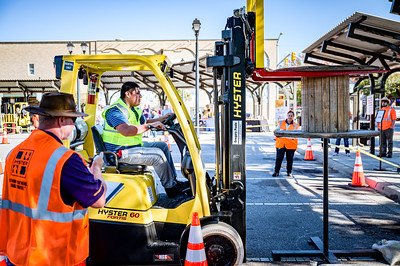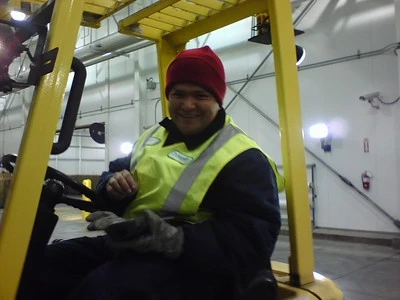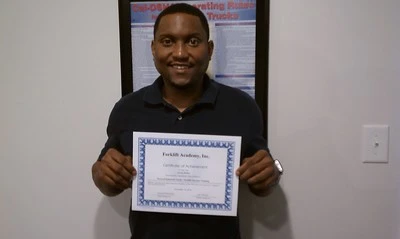How to Fail a Forklift Test? (7 Ways to Fall Short)
January 23, 2024 | by Mike Pattenson


Have you ever wondered what it takes to fail a forklift test? It might sound odd, but knowing what not to do is just as important as knowing what to do. In this article, we’re going to talk about the common mistakes people make when they’re trying to pass their forklift test.
We’ll look at things like ignoring safety rules, not being prepared enough, and other slip-ups that can lead to a big, red ‘F’ on your test. Whether you’re new to forklifts or just need a refresher, this guide will help you understand the don’ts of forklift testing, making sure you’re on the right track to pass with flying colors.
1. Ignoring Safety Procedures
When you’re driving a forklift, staying safe is super important. But sometimes, people forget to do simple things that keep them and others safe. For example, they might not check if the forklift is working right before they start using it, or they might not wear the right safety stuff like helmets or vests. These might seem like small things, but they’re actually really important to avoid accidents.
Also, there are other safety steps that people often skip. This includes not paying attention to signs that warn you where and how to drive safely, or not following the rules about how much weight the forklift can safely carry. Ignoring these rules can lead to big problems, like the forklift tipping over or dropping something heavy.
Remember, every time you use a forklift even in the test, doing these safety checks and following the rules isn’t just about passing the test, it’s about keeping you and everyone around you safe.
2. Lack of Proper Training
Before you even think about taking a forklift test, it’s really important to get the right training. Driving a forklift isn’t like driving a car; it’s a whole different thing. If you don’t get trained well, it shows. You might find it hard to use the forklift’s controls properly, like lifting or moving things smoothly.
Also, if you don’t understand how a forklift works, like what all its parts do, you’re more likely to make mistakes. Good training teaches you not just how to drive the forklift, but also how to handle it in different situations, like when carrying heavy loads or moving in tight spaces. Without this knowledge, you’re not just at risk of failing the test, but you could also be a risk to yourself and others.
If you don’t have prior knowledge, I really suggest taking the online forklift training to have a grasp of forklift operation.
3. Misunderstanding the Test Requirements
Let’s talk about what usually happens in a forklift test. It’s not just about driving around. The test checks if you can use a forklift safely and correctly. But sometimes, people get it wrong about what the test is really looking for.
For example, they might think it’s all about how fast they can move stuff around. But that’s not the case. It’s more important to be careful and precise. If you rush and don’t pay attention to how you’re lifting and moving things, you could fail the test. It’s like in school – it’s not just about finishing first, but about doing it right.
Also, the test isn’t just about driving the forklift. It checks other things too, like if you know where to drive and where not to, or how to load and unload things safely. Some folks think if they can just drive the forklift forward and back, they’re set.
But there’s more to it. You need to show you can handle the forklift in different situations, like turning in tight spaces or stacking things up high.
If you don’t understand these parts of the test, you might end up making mistakes. So, it’s key to know what the test covers and practice all those things, not just the driving part.
4. Poor Handling and Operation Skills
When you’re operating a forklift, it’s really easy to make mistakes if you’re not careful. One common error is not lifting things the right way. Maybe you lift too high or too low, or you’re not balanced right. This can cause whatever you’re carrying to fall off, which is dangerous and definitely something you’ll get marked down for in a test.
Another mistake is stacking things wrong. If you stack boxes or pallets in a messy way, they could topple over, which is a big no-no both in the test and in a real job. You’ve got to make sure everything is stacked neatly and securely.
Also, driving the forklift itself can be tricky. Some folks have a tough time steering around corners or driving in reverse. If you bump into things or can’t navigate tight spots, it’s not just bad for the test; it’s also a problem when you’re working for real. These mistakes can lead to accidents or damage to the stuff you’re carrying or the warehouse.
So, in the test and on the job, you need to show you can handle the forklift well – lifting, stacking, and moving around safely and smoothly.
5. Neglecting the Importance of Load Stability
Load stability is a big deal when you’re operating a forklift. It’s all about making sure whatever you’re carrying stays put and doesn’t fall off. If you don’t get this right, it can lead to trouble, both in the test and on the job.
First off, how you place things on the forklift matters a lot. If you put the load too far forward or too far back, it can make the forklift unsteady. Imagine trying to walk with a heavy backpack that’s not strapped on right – it’s kind of like that. The forklift can tip over if the weight isn’t balanced properly.
Also, the way you move with the load is important. If you turn too fast or stop suddenly, the stuff you’re carrying can slide off or get damaged. In a test, if you can’t show that you know how to keep the load stable, you probably won’t pass. And in real work, mishandling loads can cause accidents, damage goods, or even hurt people.
So, remembering to check your load and move carefully is key to being a good forklift driver. It is one of the criteria the forklift trainer will see to let you pass the certification test.
6. Overconfidence and Complacency
Sometimes, people who’ve been driving forklifts for a while, or even new drivers who feel really confident, might start to get a bit too relaxed about it. They think they know everything and can handle any situation. But this overconfidence can lead to big mistakes. When you’re too sure of yourself, you might start skipping safety checks, or you might drive too fast because you think you’ve got it all under control. This is when accidents happen.
It’s important to remember that a forklift is a powerful machine. It can be really dangerous if it’s not used right. No matter how good you are at driving one, you still need to be careful and pay attention. Each time you get on a forklift, it’s crucial to respect its power and remember the risks.
Even if you’ve done something a hundred times, like lifting a load or driving through a warehouse, you need to stay focused. Being complacent – which means being too comfortable and not paying attention – can lead to careless errors. These errors might cause you to fail the test or, worse, cause an accident in real life. Always keep in mind that safety and vigilance are key in handling a forklift well.
7. Being Not Aware of the Surroundings
Being aware of your surroundings is super important when you’re operating a forklift. It’s not just about the forklift and the load you’re carrying; you’ve also got to pay attention to everything around you. This means keeping an eye out for people walking by, noticing any changes in the floor like spills or objects, and being aware of other vehicles or equipment in the area.
If you’re not looking out for these things, it can lead to serious problems. For example, if you don’t notice someone walking close by, you could accidentally hit them. Or, if you miss seeing a spill on the floor, you could drive over it and lose control of the forklift. In a test, if you’re not showing that you’re aware of your environment, it’s likely you’ll fail because it’s a big part of being a safe forklift operator.
In real work situations, not being aware of your environment can cause accidents, hurt people, or damage goods and equipment. It’s not just about focusing on what’s in front of you; you need to be constantly checking all around you and be ready to react if something changes. Always remember, good forklift driving is as much about what’s happening around you as it is about handling the forklift itself.
Conclusion
Failing a forklift training test usually comes down to a few common issues: ignoring safety procedures, lacking proper training, misunderstanding what the test is all about, poor handling skills, not paying attention to load stability, being overconfident, and not being aware of your surroundings. Remember, driving a forklift is a big responsibility.
To pass the test and be a safe operator, it’s important to take the training seriously, understand and respect the power of the forklift, and always stay alert and focused. Avoid these common pitfalls, and you’ll be on your way to not just passing the test, but also being a safe and reliable forklift operator.
RELATED POSTS
View all



